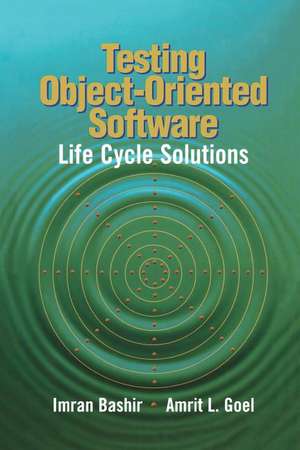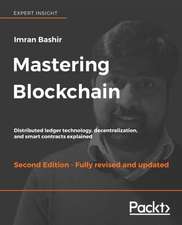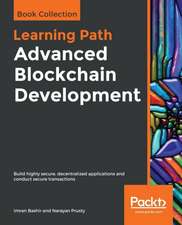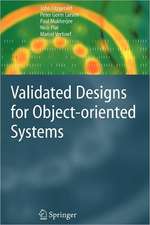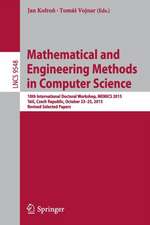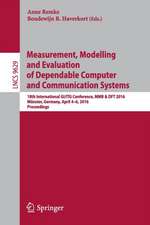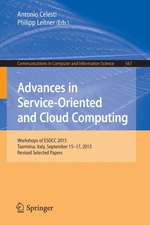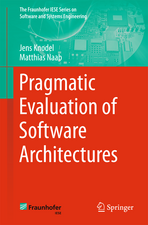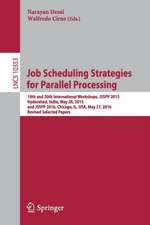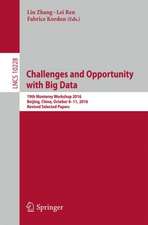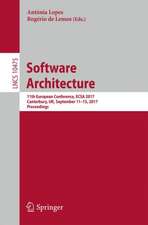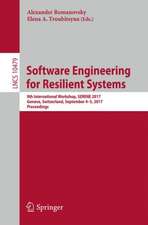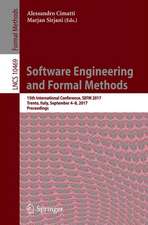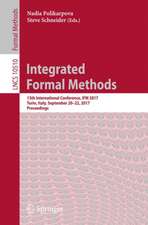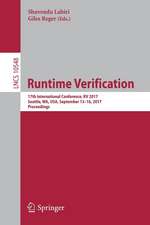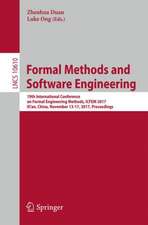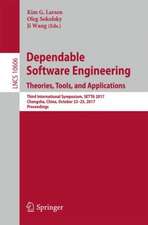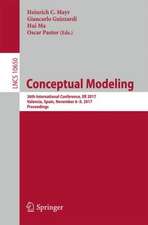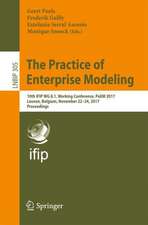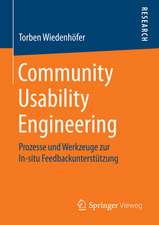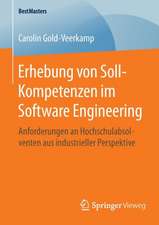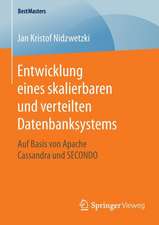Testing Object-Oriented Software: Life Cycle Solutions
Autor Imran Bashir, Amrit L. Goelen Limba Engleză Paperback – 30 sep 2012
| Toate formatele și edițiile | Preț | Express |
|---|---|---|
| Paperback (1) | 329.26 lei 6-8 săpt. | |
| Springer – 30 sep 2012 | 329.26 lei 6-8 săpt. | |
| Hardback (1) | 333.88 lei 6-8 săpt. | |
| Springer – 17 dec 1999 | 333.88 lei 6-8 săpt. |
Preț: 329.26 lei
Preț vechi: 411.57 lei
-20% Nou
Puncte Express: 494
Preț estimativ în valută:
63.00€ • 65.96$ • 52.13£
63.00€ • 65.96$ • 52.13£
Carte tipărită la comandă
Livrare economică 05-19 aprilie
Preluare comenzi: 021 569.72.76
Specificații
ISBN-13: 9781461271796
ISBN-10: 1461271797
Pagini: 232
Ilustrații: XIX, 209 p.
Dimensiuni: 155 x 235 x 12 mm
Greutate: 0.33 kg
Ediția:Softcover reprint of the original 1st ed. 1999
Editura: Springer
Colecția Springer
Locul publicării:New York, NY, United States
ISBN-10: 1461271797
Pagini: 232
Ilustrații: XIX, 209 p.
Dimensiuni: 155 x 235 x 12 mm
Greutate: 0.33 kg
Ediția:Softcover reprint of the original 1st ed. 1999
Editura: Springer
Colecția Springer
Locul publicării:New York, NY, United States
Public țintă
Professional/practitionerCuprins
1 Introduction.- 1.1 Why a Book on Testing Object-Oriented Software?.- 1.2 Outline of Book.- 2 Software Process and Testing Models.- 2.1 Software Process Models.- 2.2 Object-Oriented Software Development and Testing Model.- 2.3 Summary.- 3 Impact of Object Orientation on Testing.- 3.1 Encapsulation.- 3.2 Information Hiding.- 3.3 Abstraction.- 3.4 Inheritance.- 3.5 Reuse.- 3.6 Testability of Object-Oriented Systems.- 3.7 Summary.- 4 Requirements Testing.- 4.1 Objective.- 4.2 Approach.- 4.3 Activities.- 4.4 Resources.- 4.5 Effort.- 4.6 Acceptance Criteria.- 4.7 Summary.- 5 Design Testing.- 5.1 Objective.- 5.2 Approach.- 5.3 Activities.- 5.4 Resources.- 5.5 Effort.- 5.6 Acceptance Criteria.- 5.7 Summary.- 6 Base Classes Unit Testing.- 6.1 Objective.- 6.2 Approach.- 6.3 Activities.- 6.4 Resources.- 6.5 Effort.- 6.6 Acceptance Criteria.- 6.7 Summary.- 7 Derived Classes Unit Testing.- 7.1 Test Procedure.- 7.2 Analysis.- 7.3 Summary.- 8 Testing C++ Special Features.- 8.1 Static Data Members.- 8.2 Function Pointers.- 8.3 Structs as Data Members.- 8.4 Nested Classes.- 8.5 Member Access Controlaccess control.- 8.6 Composite Classes.- 8.7 Abstract Classes.- 8.8 Summary.- 9 Code Reviews.- 9.1 Objective.- 9.2 Approach.- 9.3 Activities.- 9.4 Resources.- 9.5 Effort.- 9.6 Acceptance Criteria.- 9.7 Language-Independent Errors Checklist.- 9.8 Object-Oriented Errors Checklist.- 9.9 Summary.- 10 Integration Testing.- 10.1 Objective.- 10.2 Approach.- 10.3 Activities.- 10.4 Resources.- 10.5 Effort.- 10.6 Acceptance Criteria.- 10.7 Summary.- 11 Integrated-System Testing.- 11.1 Objective.- 11.2 Approach.- 11.3 Activities.- 11.4 Resources.- 11.5 Effort.- 11.6 Acceptance Criteria.- 11.7 Summary.- A SampleStatistic Class Source Code.- A.1 Header File.- A.2 Source File.- B SampleHistogram Class Source Code.- B.1 Header File.- B.2 Source File.- C PriorityQueue Class Source Code.- C.1 Eiffel Implementation.- C.2 C++ Header File.- C.3 C++ Source File.- D Algorithms for Drawing MaDUM.- D.1 Base Class MaDUM Algorithm.- D.2 Derived Class MaDUM Algorithm.- E Test Data Adequacy Axioms.- E.1 “Obvious” Axioms.- E.1.1 Applicabilityapplicability.- E.1.2 NonExhaustive Applicability.- E.1.3 Monotonicity.- E.1.4 Inadequate Empty Set.- E.1.5 Renaming.- E.1.6 Complexity.- E.1.7 Statement Coverage.- E.2 “Not-so-obvious” Axioms.- E.2.1 Antiextensionality.- E.2.2 General Multiple Change.- E.2.3 Antidecomposition.- E.2.4 Anticomposition.- References.
